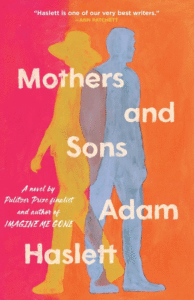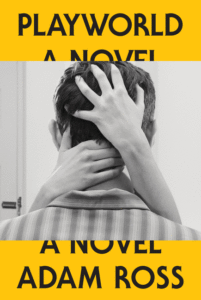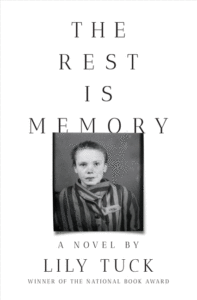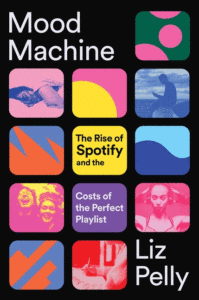5 Book Reviews You Need to Read This Week

Our basket of brilliant reviews this week includes Tom Crewe on Adam Haslett’s Mothers and Sons, Ron Charles on Adam Ross’ Playworld, Joanna Scutts on Stephanie Gorton’s The Icon and the Idealist, Mark Athitakis on Lily Tuck’s The Rest is Memory, and Hua Hsu on Liz Pelly’s Mood Machine.
Brought to you by Book Marks, Lit Hub’s home for book reviews.
*
“Three novels in, a writer is running low on secrets. We know for sure, now, what Adam Haslett likes to put down on the page. Dead men (usually fathers). Widows (usually nature-loving). The children left behind (usually siblings, one of whom grows up a gay man). Unequal gay relationships, in which one partner provides sexual favors but yearns to be looked at and kissed. Houses as sites of memory and complicated belonging. Pity, shame and loneliness. Depression or anxiety figured as a beast, lurking, prowling and pouncing.
…
“Mothers and Sons is Haslett’s best novel. By limiting his area of inquiry, he achieves new levels of moral depth and narrative push. But he has not escaped old problems; in some ways he has entrenched them. The past remains an accurate predictor of future ills, leading characters to banal and often sentimental therapeutic realizations…Indeed the quantity of remembered events, all of them in the service of Haslett’s main themes, undermines his argument for our bursting multifariousness: everything fits, too neatly and tightly. And it means that we tend to be told about the lives and personalities of characters, rather than learning from their actions and speech. Constantly looking backward, we lose the pleasure, and the interest, of living with them in the moment.”
–Tom Crewe on Adam Haslett’s Mothers and Sons (The New York Times Book Review)
“But as autobiographical as Playworld appears to be, it’s not a survivor’s memoir disguised in a wrestler’s too-revealing singlet. This is a bildungsroman from which anger has been vented, and what’s left behind is redolent with insight, tenderness and forgiveness…The narrator’s voice is an extraordinary hybrid of a boy’s plaintive innocence and a man’s wry reflection. Somehow, Ross can recall high school with enough fidelity to re-create on the page that visceral feeling of utter bafflement at the behavior of adults.
But nothing baffles Ross as a narrator. His powers of observation and sensation seem to invade every nook of these lives like the tentacles of some giant octopus with consciousness in every sucker. You may hear echoes of Garth Risk Hallberg or even a young Jonathan Franzen, but Ross writes without their exhausting voraciousness. There’s not a dull line, and yet his prose doesn’t feel like a Christmas tree so freighted with baubles that the branches risk shearing off. Forget the long delay; all those years of polishing Playworld to a high sheen paid off. The story captures that precarious moment in a young man’s life when he managed—despite interference and neglect from adults who owed him more—to ride his bike around the greatest city in the world and luxuriate in a kind of freedom that feels impossible nowadays.”
–Ron Charles on Adam Ross’ Playworld (The Washington Post)
![]()
“On its face, The Icon and the Idealist is not a book about abortion. Thanks to advances in technology and medical knowledge, Americans have become accustomed to an ideological separation between contraception and termination, sensible planning and irresponsible destruction. What Stephanie Gorton’s exhaustive history of the fight to legalize birth control makes clear, however, is that we maintain that separation at our peril. The fights share a history and a rhetoric: “dichotomies of choice against fate, medical technology against nature, bodily autonomy versus submission to divine will.” They also share a newly empowered set of enemies.
…
“The split between Dennett’s and Sanger’s approaches—persuasion versus provocation—is widely mirrored in other movements of the time, especially women’s suffrage. Examining them together, and seeing all the ways they overlapped, changed course, and compromised over the long fight, is both fascinating and frustrating. Might they have gone further, faster, if they had worked together, or at least managed to get out of each other’s way? Perhaps. But what their shared story also reveals is the relentless, hypocritical, and cowardly nature of their opposition; it’s damning to see how rare it was for men to speak out in support of something that demonstrably improved their own lives. We have all seen how complacency over “settled law” and the belittling of feminists’ warnings hurtled us into the overturning of Roe. Fired up by that recent history, this book makes it clear that we still have a long way to go to match Mary Ware Dennett’s simple, fundamental belief that women are people.”
–Joanna Scutts on Stephanie Gorton’s The Icon and the Idealist (The New Republic)
“Lily Tuck’s eight novel, The Rest Is Memory, concerns the life of Czesława Kwoka, a Polish Catholic girl who was killed at Auschwitz on March 12, 1943. The facts of her life beyond that are scant. She was just 14 when she died; her narrative defies the concept of a human arc. Tuck attempts to fill in some gaps but only so many. This slim book is informed by a tragic constriction—every element of Czesława’s life is defined by being unfinished. Some of our greatest literature about the Holocaust, including Elie Wiesel’s Night (1960) and Anne Frank’s The Diary of a Young Girl (1947), chronicles the lives of adolescents. For Tuck, the assignment here is, of course, a bit different. She must fill out the life of this young girl on her own.
…
“The Rest Is Memory is narrated as a formal composite of fiction and nonfiction. Tuck imagines snippets and fragments from Czesława’s life, and combines them with historical facts. The effect is bluntly descriptive, preferring the Olympian point of view to close third-person perspective. Tuck doesn’t presume to get too far into the girl’s feelings, though she does want to provide her with experiences, however fragmentary. And it’s the cautiously constructed, fragmentary descriptions that give the novel its power. Czesława’s life appears in scraps of memory: a Catholic catechism, her first crush, her experience in the camps. The novel is broken up into very short sections that usually end bluntly and unhappily—the other shoe drops, the hammer falls, death comes.
…
“The novel is deceptively smooth, built on a simple frame of Czesława’s brief, unhappy life, girded by the unpleasant but reassuring structure of facts and footnotes. The spikiness of each section, as well as each sentence, emerges fully, cycling from one cutoff story to another. This has been a common strategy in literary fiction, designed to capture a sense of precariousness and disassociation. The distinction here is that the pressure that creates the fragments comes from the pressures of historical cruelty; the disassociation comes from the camps shattering every story.”
–Mark Athitakis on Lily Tuck’s The Rest is Memory (The Los Angeles Review of Books)
“Pelly has covered the ascent of Spotify for years, and she was an early critic of how the streaming economy relies less on delivering hit tunes than on keeping us within a narrow gradient of chill vibes. Her approach is aggressively moralistic: she is strongly influenced, she explains, by D.I.Y. spaces that attempt to bring about alternate forms of ‘collective culture,’ rather than accept the world’s inequities as a given. She sympathizes with the plight of artists who feel adrift in the winner-take-all world of the Internet, contending with superstars like Adele or Coldplay for placement on career-making playlists and, consequently, a share of streaming revenue. But her greatest concerns are for listeners, with our expectations for newness and convenience. Pelly is a romantic, but her book isn’t an exercise in nostalgia. It’s about how we have come to view art and creativity, what it means to be an individual, and what we learn when we first hum along to a beloved pop song.
…
“For Pelly, it’s a problem less of taste than of autonomy—the question she asks is if we’re making actual decisions or simply letting the platform shape our behaviors. Decades ago, when you were listening to the radio or watching MTV, you might encounter something different and unknown, prompting some judgment as to whether you liked or loathed it. The collection of so much personalized data—around what time of day we turn to Sade or how many seconds of a NewJeans song we play—suggests a future without risk, one in which we will never be exposed to anything we may not want to hear.”
–Hua Hsu on Liz Pelly’s Mood Machine: The Rise of Spotify and the Costs of the Perfect Playlist (The New Yorker)




